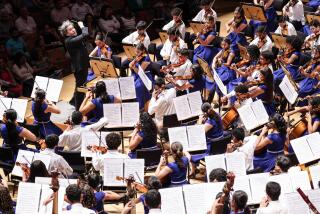Oh, the Pitfalls of Virtuosity
The pitfall of virtuosity is slickness, which conductor Vladimir Spivakov and his Moscow Virtuosi did not wholly avoid in concerts over the weekend in Los Angeles and Costa Mesa.
What is the point of such brilliant precision and polished elegance if Mozartâs Symphony No. 29, played for some reason without pause between movements Friday at the Dorothy Chandler Pavilion, emerges so streamlined and bland? Or if Tchaikovskyâs dramatic Serenade for Strings, played on the same concert with the same ensemble qualities, sounds like mere salon music?
Spivakov seemed content to set tempos, beat time with swooping gestures and stay on the surface of this music.
Fortunately, he found more of the variety in style, form and character that Tchaikovsky put in âThe Childrenâs Album,â a collection of 24 miniatures, Saturday in a program sponsored by the Philharmonic Society at the Orange County Performing Arts Center. Spivakov and Vladimir Milman orchestrated the piano original.
But in Haydnâs âFarewellâ Symphony, also on Saturday, despite the lovely reenactment of the premiere at which the musicians blew out their candles and walked off stage, he was back to an approach so refined and genteel that the conflict in the music turned pale.
Common to both programs were two pieces: Arvo Partâs âFratres,â arranged for violin, strings and percussion; and Shostakovichâs Concertino, arranged for piano and strings by soloist Julia Zilberquit.
Spivakov was a powered and sweet-toned soloist in âFratres,â but the performance of this early example of whatâs now called âHoly Minimalismâ lacked even a smidgen of religious feeling. Zilberquit was a forceful and rhapsodic soloist in the Concertino, but her arrangement and cadenza made the work sound closer to Rachmaninoff than Shostakovich.
Some of the most impressive ensemble work came in the encores. Los Angeles heard three; Costa Mesa, four. In L.A., these were an early Mozart Allegro, Tchaikovskyâs âNeapolitan Songâ and a dance from Fallaâs âEl Amor Brujo.â Costa Mesa got the same three, but also a ravishing Haydn Adagio, with Spivakov at his most sensitive as soloist.
On the other hand, Los Angeles listed the only women in the ensemble, percussionist Alla Mamyko. Orange County left her off the roster.
More to Read
The biggest entertainment stories
Get our big stories about Hollywood, film, television, music, arts, culture and more right in your inbox as soon as they publish.
You may occasionally receive promotional content from the Los Angeles Times.










